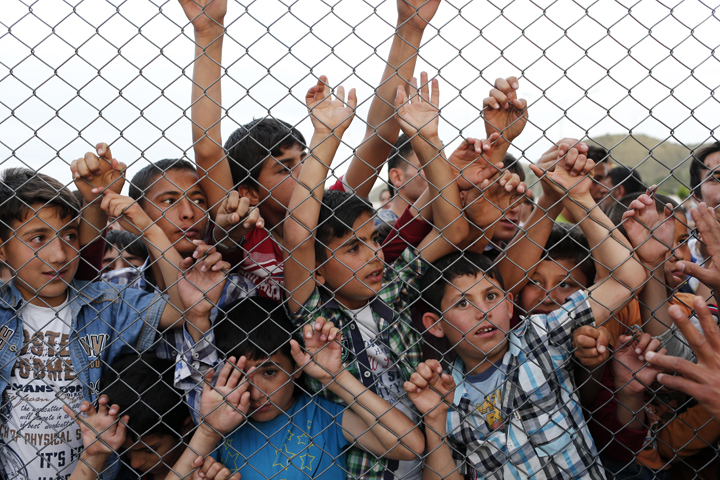
Catholics should protest against immigration policies that could put the lives of children at risk, said Cardinal Vincent Nichols of Westminster.
He said European policies toward migrants were being shaped by "caution and fear," resulting in suffering among refugees trying to enter safe countries of the European Union.
In his homily at an annual diocesan Mass for migrants in Westminster Cathedral, London, he said "a voice of protest is needed," especially when the lives of children were at stake.
"While it is right to keep silent when children are asleep, it is never right to stay silent when they are perishing at sea or at risk in hostile camps," said Nichols, president of the Bishops' Conference of England and Wales, during the Mass May 2.
"From those who deal in creating fear of migrant people and who seek to profit from that fear, whether financially or politically, we ask for a more responsible leadership, a leadership that looks at all that we gain as well as the problems we confront," the cardinal said.
Nichols told the congregation that London "would not function" without the "great contribution" of its migrant communities. However, he suggested that new policies aimed at restricting immigration meant that the United Kingdom could not show greater hospitality to refugees even if its citizens wanted to.
In an allusion to an EU deal with Turkey to expel migrants, he criticized "international plans that often seem to treat people purely as problems or even as packages to be sent from place to place."
"We hope that the way in which governments respond to the immense challenge which faces us will take more seriously the personal generosity of so many, in this country, too, who are willing to welcome refugees and desperate migrants and yet are hindered from doing so by policies shaped more by caution and fear," he said.
"We hear reports of sadness, dismay, frustration, anger, rejection and humiliation: from Iraq and Jordan, to Libya and Calais," he continued.
"Yes, this is 'a vale of tears' as both the Mediterranean and the Aegean Seas become, in the Holy Father's words, graveyards for children, the elderly and their families," he said.
The cardinal said he prayed that the nation's leaders would "find the courage and imagination to respond more generously to those in need, speeding up our own resettlement program and looking to see how other avenues of rescue and support can be provided," he added.
The cardinal's comments came amid the enforcement of a controversial deal to send migrants crossing the Aegean Sea back to Turkey in an attempt to halt a vast flow of people into the EU from Africa, the Middle East and South Asia. Last year, the phenomenon resulted in more than a million people arriving in Germany alone.
The deal means that Turkey will receive $5.8 billion from the European Union, an assurance that it will join the EU, and the right of 77 million Turks to travel without visas throughout most of the bloc, under the Schengen Agreement.
In exchange, the Turkish government would accept the return of any migrant who failed to register for asylum upon arrival in Greece.
The deal went into effect March 20 and coincided with the closure of overland routes into northern Europe through the Balkans. Migrants continue to enter via the Mediterranean, however, with some 300,000 expected to attempt the often deadly 185-mile crossing from North Africa to Italy over the summer.
Nichols' remarks also came as the British government resists pressure to allow 3,000 child refugees already in the EU to enter Britain. The government has argued that because the refugees have arrived in safe countries they did not need to be transported to Britain.
The United Kingdom has a separate program to resettle 20,000 refugees from the Syrian war, along with 3,000 displaced children from camps in the Middle East.
At the Vatican, top officials of the Council of European Bishops' Conferences, known by the acronym CCEE, met with Pope Francis May 2 and heads of various dicasteries during their May 2-4 visit to Rome. The presidency members -- a president and two vice presidents -- were ending their five-year term this year.
Speaking to reporters May 3 at the Vatican, Hungarian Cardinal Peter Erdo of Esztergom-Budapest, CCEE president, said individual countries are facing the challenge of the immigration and refugee crisis. While the European continent as a whole must also come together to respond to the dilemma, each nation is in its own unique situation, which requires localized responses, he said.
"Therefore it's necessary to patiently and perceptively examine the situation of each region in order to find a concrete Christian-Catholic response to the situations," Erdo said.
A blanket or mandatory solution is impossible, he said, not only because national laws are different, but because each nation faces a different challenge depending on whether it is a country of origin, transit or destination for refugees and forced migrants. So, for example, he said, a mandatory policy of integrating newcomers does not work if migrants do not want to stay in the so-called country of transit and to do so "would be a restriction on their freedom" to move.



